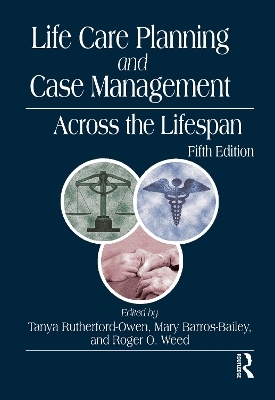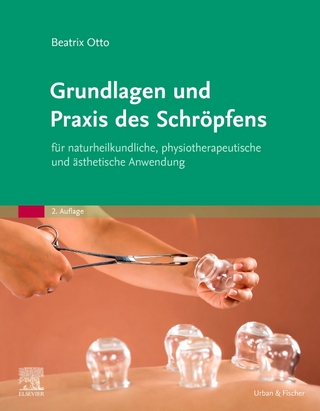
Life Care Planning and Case Management Across the Lifespan
Routledge (Verlag)
978-1-032-48320-7 (ISBN)
Celebrating 25 years since its first publication, the fifth edition of this best-selling text is the most up-to-date and complete resource available on what a life care planner does, how the life care planner does it, and issues that affect the day-to-day role of a life care planner.
Now featuring new material on pediatric life care planning and case management, including brachial plexus injuries and neurodevelopmental disorders, this new edition provides guidance and planning for cases across the lifespan. It begins with a series of chapters examining ten different professional specializations that often contribute to a life care plan, before providing critical information for developing life care plans for individuals with different physical, mental, and cognitive conditions including spinal cord injury, brain injury, and chronic pain. Uniquely comprehensive, the book also includes chapters on the forensic and legal context of life care planning, as well as equipment/technology, evidence-based literature/resources, and special education/special needs planning relevant to pediatric life care planning.
Also including chapters dedicated to life care planning methodology and life care planning research, this is an essential resource for anyone practicing or studying life care planning or managing the needs of those requiring chronic medical care over the lifespan.
Tanya Rutherford-Owen, PhD, CRC, CLCP, CDMS, LPC, FIALCP is a certified rehabilitation counselor, certified life care planner, and life care planning fellow. She has over 25 years of experience providing rehabilitation services and forensic work in various states. She has served as an adjunct professor at the University of Arkansas in the Department of Rehabilitation Education and Research and is currently an adjunct faculty member of Capital University Law School. She has served on the Board of Directors for the Foundation for Life Care Planning & Rehabilitation Research and served as a work group member in the development of the fourth edition of the Standards of Practice for Life Care Planners. She has independently researched and published articles in peer-reviewed journals including Journal of Life Care Planning, The Rehabilitation Professional and the Journal of Rehabilitation. She worked as the editor of the Journal of Life Care Planning (JLCP) from 2016-2020, prior to assuming the managing editor role for both the Journal of Life Care Planning and The Rehabilitation Professional. Dr. Owen earned a PhD in Rehabilitation in 2011 and a Master’s degree in Counseling Psychology in 1996. In 1993, she graduated Magna Cum Laude and Phi Beta Kappa from Millsaps College. She has provided testimony in various state and federal courts and in Social Security disability adjudication hearings for 20 years. In the course of her work, she has received various awards including the Sherry Jasper Memorial Award (2022) by the Foundation for Life Care Planning & Rehabilitation Research; Outstanding Life Care Planning Educator Award (2018); a President’s Commendation Award from the International Association of Rehabilitation Professionals (IARP, 2017 & 2018); Best Student Paper Award by the Foundation for Life Care Planning Research & International Academy of Life Care Planners (2011); the Outstanding Rehabilitation Education & Research Doctoral Student at the University of Arkansas (2010); the Russell Baxter Award at the University of Arkansas (2010–2011); and was a Doctoral Academy Fellow at the University of Arkansas (2009–2011). Mary Barros-Bailey, PhD, CRC, CLCP, NCC, ABVE/AE, CVE, CCC is a Multilingual Rehabilitation Counselor (Spanish/English/Portuguese), Vocational Expert, Life Care Planner, and principal with Intermountain Vocational Services, Inc. She is a practitioner-scientist with a national, sometimes international, caseload. Dr. Barros-Bailey is adjunct faculty at Capital University Law School’s graduate certificate in life care planning and has taught with a variety of graduate programs in rehabilitation counseling. She serves as a peer reviewer or on editorial boards of peer-review publications, has presented over 200 times nationally and internationally, and authored over 130 publications such as a book, textbook chapters, and peer-reviewed journal articles. Recent awards are: Best Article, The Advocate, Idaho State/Idaho Bar Foundation, Inc. (2018); Alumni Achievement Award, Middlebury Institute of International Studies (2018); Outstanding Educator Award, Foundation for Life Care Planning Research (2017); and Lifetime Achievement Award, International Association of Rehabilitation Professionals (2016). Dr. Barros-Bailey is currently a Fulbright Specialist working with the largest rehabilitation counseling organization in Australia and rehabilitation counseling credentialing organization in the world to establish the first credential in forensic vocational rehabilitation in the southern hemisphere. Roger O. Weed, PhD, CRC/R, LPC/Ret, CCM/R, CDMS/R, FNRCA, FIALCP/R, Professor Emeritus, and Fellow Emeritus, International Academy of Life Care Planning, is retired as professor and graduate rehabilitation counseling coordinator at Georgia State University. He also held doctoral student graduate faculty status in Counseling Psychology as well as Counselor Education and Practice doctoral programs. He has authored or co-authored approximately 200 books, reviews, articles, and book chapters, more than 80 of which were specific to life care planning. Prior to achieving the PhD, Dr. Weed practiced rehabilitation counseling and consulting for 15 years in Alaska. During his more than 42 years in the profession, Dr. Weed was honored several times for his work including the Distinguished Professor Award (2006) from Georgia State University’s Alumni Association (sole recipient), Lifetime Appreciation Award from the International Commission on Health Care Certification (2011), Larry Huggins Lifetime Achievement Award (2009) from the Private Rehabilitation Specialists of Georgia, Lifetime Achievement Award (2005), from the sponsors of the International Life Care Planning Conference, Lifetime Achievement Award from the International Association of Rehabilitation Professionals (2004) (as well as recognition in 1997 and 1991 as the Outstanding Educator), the National Professional Services Award from the American Rehabilitation Counseling Association (1993), and Research Excellence Award (2003) from the College of Education at Georgia State University. Dr. Weed is the creator and senior editor for the first four editions of the Life Care Planning and Case Manager Handbook. He is one of the five founders of the original, nationwide training program leading to life care planning certification. He is also past-chair of the Georgia State Licensing Board for professional counselors, marriage and family therapists, and social workers, as well as past-president of the International Association of Rehabilitation Professionals.
Part One – Historical, Methodological, Professional, Professional Issues and Research in Life Care Planning. 1.Life Care Planning: Past, Present and Future. 2.Methodology, Scope of Practice, Standards of Practice, and Consensus in Life Care Planning. 3.Research in Life Care Planning. 4.Credentialing in Life Care Planning. 5.Ethics in Life Care Planning. 6.Multicultural and Cross-Cultural Considerations for Life Care Planning. Part Two – Life Care Planning Across the Lifespan. 7.Pediatric Care Management in Life Care Planning. 8.Elder Care Management in Life Care Planning. Part Three – The Transdisciplinary Team. 9.The Role of the Physiatrist in Life Care Planning. 10.The Role of the Rehabilitation Nurse in Life Care Planning. 11.The Role of the Rehabilitation Counselor in Life Care Planning. 12.The Role of the Neuropsychologist in Life Care Planning. 13.The Role of the Neurologist in Life Care Planning. 14.The Role of the Occupational Therapist in Life Care Planning. 15.The Role of the Physical Therapist in Life Care Planning. 16.The Role of the Speech-Language Pathologist and the Audiologist in Life Care Planning. 17.The Role of the Prosthetist in Life Care Planning. 18.The Role of the Economist in Life Care Planning. Part Four – Physical, Mental and Cognitive Conditions. 19.Life Care Planning for the Patient with an Amputation. 20.Life Care Planning for Acquired Brain Injury. 21.Life Care Planning for the Patient with Burns. 22.Life Care Planning for the Patient with a Mental Health Disorder. 23.Life Care Planning for the Patient with Chronic Pain. 24.Life Care Planning for the Patient with Spinal Cord Injury. 25.Life Care Planning for the Patient with Visual Impairment. 26.Life Care Planning for the Patient with a Brachial Plexus Injury. 27.Forensic Issues in Life Care Planning. 28.Admissibility Considerations in Life Care Planning. 29.A Plaintiff’s Attorney’s Perspective on Life Care Planning. 30.A Defense Attorney’s Perspective on Life Care Planning. 31.Special Education Law and Practices for the Pediatric Life Care Planner. 32.Special Needs Planning. 33.Assistive Technology, Durable Medical Equipment, and Transportation in Life Care Planning. 34.A Personal Perspective of Life Care Planning. 35.Life Care Planning Costing, Literature, and Summary of Resources.
| Erscheinungsdatum | 25.11.2023 |
|---|---|
| Zusatzinfo | 70 Tables, black and white; 14 Line drawings, black and white; 31 Halftones, black and white; 45 Illustrations, black and white |
| Verlagsort | London |
| Sprache | englisch |
| Maße | 178 x 254 mm |
| Gewicht | 1960 g |
| Themenwelt | Sachbuch/Ratgeber ► Gesundheit / Leben / Psychologie |
| Medizin / Pharmazie ► Allgemeines / Lexika | |
| Medizin / Pharmazie ► Pflege | |
| Recht / Steuern ► Allgemeines / Lexika | |
| Recht / Steuern ► EU / Internationales Recht | |
| ISBN-10 | 1-032-48320-2 / 1032483202 |
| ISBN-13 | 978-1-032-48320-7 / 9781032483207 |
| Zustand | Neuware |
| Informationen gemäß Produktsicherheitsverordnung (GPSR) | |
| Haben Sie eine Frage zum Produkt? |
aus dem Bereich


